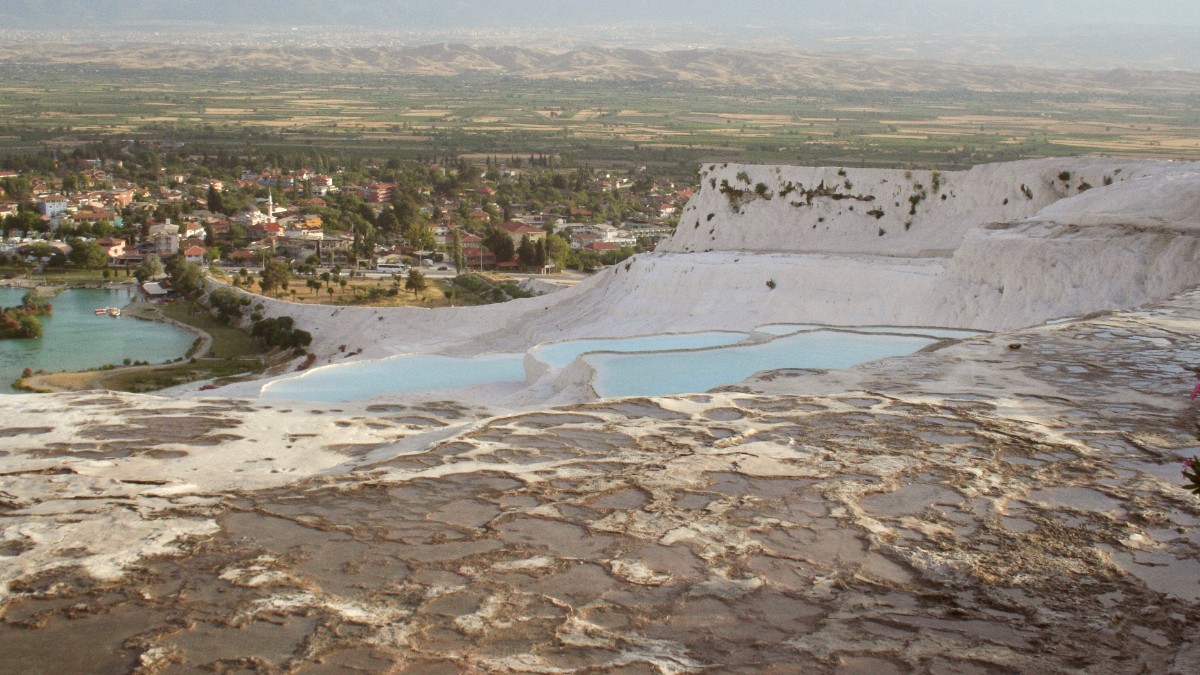
Aegean Coast, Turkey
Common ingredients include lamb, beef, and chicken, which are staples in many dishes. Vegetables like eggplant, tomatoes, peppers, and onions feature prominently, often roasted, stuffed, or used in stews. Chickpeas and lentils are common in soups and vegetarian dishes.
Bulgur, a cracked wheat, forms the base of many salads and pilafs. Yogurt accompanies countless meals and is an ingredient in sauces and drinks. Olive oil is a fundamental fat, especially in the Aegean region. Fresh herbs like mint, parsley, and dill add freshness, while spices like cumin, paprika, and red pepper flakes bring warmth and depth.
Turks are known for their warm hospitality. You may be presented a glass of Turkish tea (çay) as a gesture of welcome, especially in smaller, family-run establishments. Accepting this gesture is polite.
Bread (ekmek) is served with almost every meal. It acts as a scoop for sauces and a complement to main dishes. Many dishes, especially mezes (a selection of small appetizer dishes), are for sharing among the table.
Tipping is appreciated but not mandatory. A tip of 5-10% for good service in mid-range to upscale restaurants is suitable. In local eateries, rounding up the bill or leaving a small amount is common. Finishing everything on your plate is generally polite.
The most famous local specialty. This dish features slow-cooked lamb (or sometimes goat) roasted in a stone oven. It is typically served simply on a plate with flatbread and onions, without cutlery.
Find it in specialized kebab restaurants known as "Denizli Kebabı Salonu" in Denizli city.
Often called "Turkish pizza." This flatbread comes with various toppings, commonly minced meat (kıymalı), cheese (peynirli), or a mixed topping. It is baked in a stone oven, giving it a crispy crust.
Widely available in eateries and pide salons across Pamukkale and Denizli.
A common and delicious red lentil soup. It is often served with a squeeze of fresh lemon, adding a bright, tangy flavor. A comforting and universally liked dish.
Available in almost any traditional Turkish restaurant or lokanta.
Black tea, served in small tulip-shaped glasses. Turks consume it throughout the day.
Strong, unfiltered coffee, served in small cups. The coffee grounds settle at the bottom.
Limited in Pamukkale village. Higher-end restaurants, presenting more sophisticated menus and ambiance, are usually found within the larger thermal hotels or in Denizli city.
Numerous options exist in Pamukkale village and Denizli. These restaurants typically present traditional Turkish cuisine, various kebabs, and often a selection of international dishes catering to tourists.
Small local restaurants, known as lokanta, are excellent for budget-friendly and authentic meals. Kebab shops and pide salons offer quick, delicious, and affordable options.
More common in Denizli city than in Pamukkale village. While some tourist-oriented restaurants in Pamukkale may present limited international choices (like pizza or pasta), Denizli city has a wider array of restaurants.
Denizli city provides various international cuisines, including Italian, Chinese, and fast food chains.
Use online maps or local directories in Denizli to locate specific international restaurants.
Expect a more varied selection of global flavors in the larger urban setting.
For an authentic local meal, seek out an "esnaf lokantası" (tradesmen's restaurant) in Denizli.
These places serve home-style, pre-cooked dishes often displayed at the counter, presenting excellent value.
They provide a taste of genuine Turkish cooking at very reasonable prices.
A popular choice among Turkish workers and locals for daily meals.
As Turkey is a predominantly Muslim country, most meat served in restaurants is halal. You should have no issues finding halal food options.
Kosher food is very limited in Turkey, generally available only in major cities like Istanbul, and usually requires pre-arrangement. It is not available in Pamukkale or Denizli.
Clearly state any severe allergies. Carry a Translation card for your specific allergies in Turkish to ensure clear communication with restaurant staff. For example, "Fındık alerjim var" (I have a nut allergy).
Online forums and travel blogs dedicated to dietary travel can offer specific restaurant recommendations or advice for Turkey.
These are less common in Pamukkale compared to major Turkish cities like Istanbul or Cappadocia. They have more developed culinary tourism scenes.
It is possible to visit olive groves, vineyards, or local farms in the wider Denizli region, which is an agricultural area. However, these are not typically direct tourist offerings in Pamukkale village itself.
Local food festivals occur in Denizli city throughout the year, often related to agricultural harvests or specific local traditions.
Layers of thin phyllo pastry filled with chopped nuts (pistachios or walnuts), sweetened with syrup or honey.
A gelatinous candy, often flavored with rosewater, lemon, or pistachios, and dusted with powdered sugar.
A refreshing, salty yogurt drink, notably popular in hot weather.
A fermented turnip juice, often spicy, popular in southern Turkey.
Its unique texture makes it stretchy and chewy, often resisting melting for longer.
Always try to sample local specialties in Pamukkale and Denizli. For a truly authentic experience, look for smaller, family-run establishments where the food is often homemade and fresh.